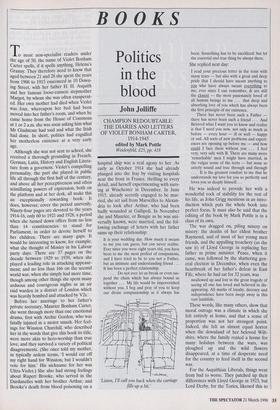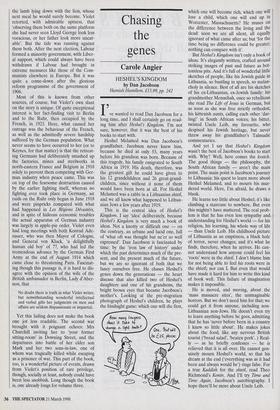BOOKS
Politics in the blood
John Jolliffe
CHAMPION REDOUBTABLE: THE DIARIES AND LETTERS OF VIOLET BONHAM CARTER, 1914-1945 edited by Mark Pottle Weidenfeld, £25, pp. 418 T0 most non-specialist readers under the age of 50, the name of Violet Bonham Carter spells, if it spells anything, Helena's Granny. They therefore need to know that aged between 21 and 28 she spent the years from 1908 to 1915 ensconced in 10 Down- ing Street, with her father H. H. Asquith and her famous loose-cannon stepmother Margot, by whom she was often exasperat- ed. Her own mother had died when Violet was four, whereupon her bed had been moved into her father's room, and when he came home from the House of Commons at 1 or 2 a.m. she was soon asking him what Mr Gladstone had said and what the Irish had done. In short, politics had engulfed her motherless existence at a very early age. Although she was not sent to school, she received a thorough grounding in French, German, Latin, History and English Litera- ture from a governess. Violet's compelling personality, the part she played in public life all through the first half of the century, and above all her perceptiveness and often scintillating powers of expression, both on the platform and at her desk, all make this an exceptionally rewarding book. It does, however, cover the period unevenly. Ninety-four pages are devoted to the years 1914-16, only 60 to 1921 and 1928, a period when she turned down offers from no less than 14 constituencies to stand for Parliament, in order to devote herself to her children. There are many gaps. It would be interesting to know, for example, what she thought of Mosley in his Labour party days. There are 37 pages on the decade between 1929 to 1939, when she played a leading role in attacking appease- ment; and no less than 166 on the second world war, when she simply had more time, though among other things she spent many arduous and courageous nights as an air raid warden in a district of London which was heavily bombed and attacked by V2s. Before her marriage to her father's private secretary, Maurice Bonham Carter, she went through more than one emotional drama, first with Archie Gordon, who was fatally injured in a motor smash. Her feel- ings for Winston Churchill, who described her in the words that give this book its title, were more akin to hero-worship than true love, and they survived a variety of political disagreements. (She once told my mother, in typically ardent terms, 'I would cut off my right hand for Winston, but I wouldn't vote for him.' His nickname for her was Ultra-Violet.) She also had strong feelings about Rupert Brooke, who served in the Dardanelles with her brother Arthur, and Brooke's death from blood poisoning on a hospital ship was a real agony to her. As early as October 1914 she had already plunged into the fray by visiting hospitals near the front in France, thrilling to every detail, and herself experimenting with nurs- ing at Winchester in December. In June 1915, already secretly engaged to be mar- ried, she set sail from Marseilles to Alexan- dria to look after Arthur, who had been badly wounded at Gallipoli. In November she and Maurice, or Bongie as he was uni- versally known, were married, and the fol- lowing exchange of letters with her father sums up their relationship:
It is your wedding day. How much it means to me you can guess, but can never realise. Ever since you were eight years old, you have been to me the most perfect of companions, and I have tried to be to you not a Father, but an intimate and understanding friend It has been a perfect relationship.
. . . Do not ever let us break or even sus- pend the chain which has always bound us together . . My life would be impoverished without you. I beg and pray of you to keep our divine companionship as it always has `Listen, I'll call you back when the carriage fills up a bit.'
been. Something has to be sacrificed: but let the essential and true thing be always there. She replied next day:
I read your precious letter in the train with many tears — but also with a great and deep pride that I should have meant anything to you who have always meant everything to me, ever since I can remember, & are still the closest — the most pasionately loved of all human beings to me .. . that deep and absorbing love of you which has always been the first principle of my existence.
There has never been such a Father there has never been such a friend ... And Beloved what I want you to know and realise is that I need you now, not only as much as before — every hour — ill or well — happy or sad. All sorts of new problems and experi- ences are opening up before me — and how could I face them without you . I feel very, very safe with B. There are many more `remarkable' men I might have married, in the vulgar sense of the term — but none so utterly sound and true through and through . .. It is the greatest comfort to me that he understands my love for you so perfectly and loves you so deeply himself. ..
He was indeed to provide her with a wonderful rock of stability for the rest of his life, as John Grigg mentions in an intro- duction which puts the whole book into perfect focus. It must also be said that the editing of the book by Mark Pottle is in a class of its own.
The war dragged on, piling misery on misery: the deaths of her eldest brother Raymond, and of most of her young men friends, and the appalling treachery (as she saw it) of Lloyd George in replacing her father as prime minister. Peace, when it came, was followed by the shattering gen- eral election in December, when even the heartbreak of her father's defeat in East Fife, where he had sat for 32 years, was
swallowed up and lost in the great tragedy of seeing all one has loved and believed in dis- appearing. All marks of loyalty, decency and independence have been swept away in this vast landslide.
These words, like many others, show that moral outrage was a climate in which she felt entirely at home, and that a sense of proportion was not her strongest point. Indeed, she felt an almost equal horror when the downland of her beloved Wilt- shire, where the family rented a house for many holidays between the wars, was ploughed up and the wild flowers disappeared, at a time of desperate need for the country to feed itself in the second war.
For the Asquithian Liberals, things went from bad to worse. They patched up their differences with Lloyd George in 1923, but Lord Derby, for the Tories, likened this to the lamb lying down with the lion, whose next meal he would surely become. Violet retorted, with admirable aptness, that `observing them both on the same platform she had never seen Lloyd George look less voracious, or her father look more uneat- able'. But the tide was running against them both. After the next election, Labour formed a minority government, with Liber- al support, which could always have been withdrawn if Labour had brought in extreme measures like those of the Com- munists elsewhere in Europe. But it was quite a come-down after the glorious reform programme of the government of 1906.
Most of this is known from other sources, of course, but Violet's own slant on the story is unique. Of quite exceptional interest is her fact-finding visit to Berlin and to the Ruhr, then occupied by the French, in 1923. Here, what caused her outrage was the behaviour of the French, as well as the admittedly severe hardship suffered by the German population. What never seems to have occurred to her (or to Keynes, for that matter) is that the retreat- ing Germans had deliberately smashed up the factories, mines and steelworks in north-eastern France and Belgium in 1918 solely to prevent them competing with Ger- man industry when peace came. This was on top of the fearsome destruction caused by the earlier fighting itself, whereas no fighting ever took place in Germany, air raids on the Ruhr only began in June 1918 and were pinpricks compared with what had happened in Les Regions Devastees, and in spite of hideous economic troubles the actual apparatus of German industry was largely in apple-pie order. Violet even had long meetings with both Konrad Ade- nauer, who was then Mayor of Cologne, and General von Kluck, 'a delightfully human old boy' of 77, who had led the tremendous advance by the German First Army at the end of August 1914 which came close to threatening Paris. Fascinat- ing though this passage is, it is hard to dis- agree with the opinion of the wife of the British ambassador in Berlin, Lady d'Aber- non, that
No doubt there is truth in what Violet writes, but notwithstanding wonderful intellectual and verbal gifts her judgments on men and affairs are seldom dispassionate or impartial.
Yet this failing does not make the book one jot less readable. The second war brought with it poignant echoes: Mrs Churchill inviting her to 'your former sitting-room' in Downing Street, and the departures into battle of her elder son Mark and her two sons-in-law, one of whom was tragically killed while escaping as a prisoner of war. This part of the book, too, is a wonderful picture of events, drawn from Violet's position of rare privilege, though, socially at least, nobody could have been less snobbish. Long though the book is, one already longs for volume three.





































































 Previous page
Previous page